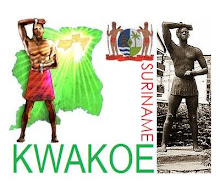

Dobru Robin “Dobru” Raveles, was born on March 29, 1935 in Paramaribo, Suriname. After attending high school, he studied law. He developed a strong sense of nationalism and during his high school period, wrote his first poem in Sranantongo, the creole language of Suriname. The source of inspiration was a Dutch schoolmaster, who doubted if one could ever write poetry in this language.He challenged Dobru and the very first poem Dobru wrote, was in Sranantongo, about poverty (“pina”).This was the beginning of his career as a poet and writer, in 1955. In 1957, he won the first price at the National Cultural Centre (“CCS”) with the poem “Fedi grabu”, which dealt with the death of his grandmother. The choices of themes came out of his social commitment, his determination to be the voice of the people for Surinamese identity. His prose stressed the Surinamese situation with emphasis on social problems, political awareness, and a strong call for independence, becauseSuriname was at that time still a colony of Holland.In his political career, Dobru was Co-founder of the Party Nationalist Republic (PNR), the politicalparty that strongly came out for independence. During his career he was a member of the National and the Latin-American Parliament (1974). In the first period of the Surinamese revolution (1980),he became the Deputy-Minister of Culture. He was also active in the field of labour. Dobru was an active member of the Suriname writers’organization, Moetete ’67 and writer’s organisation ’77. He was also a member of the Intellectuals for Sovereignty of the Peoples of the Americas. He became a free-lance journalist and wrote his political columns based on social changesfor the grassroots. He paid special attention to the peoples from the rivers, the Maroons and Amerindians. His poem “Wan Bon’ (One Tree) became well known and was translated into English, Spanish, Chinese, Hindi and Portuguese.During a visit to Guyana, Dobru learned about a meeting at the residence of the Prime Minister,where plans were made to have a Caribbean Festival. He decided to attend uninvited and he made hispoint:Suriname, although Dutch-speaking, and at the time not yet independent, was definitely a part ofthe Caribbean. At that meeting, CARIFESTA was born and Suriname with its broad-based cultural heritage became an outstanding member.Dobru kept strong ties with peoples in Latin America,the Caribbean, Africa and Asia. He became President of Suriname-Cuba Friendship Association and the North-Korean Friendship Association. With his visits to the Caribbean, the Americas, Africa and Asia, the reciting of his poetry and other Surinamese poets, and information about the country, Suriname became known worldwide. Because of his international orientation, he was able to keep close ties with other well-knownCaribbean writers.Dobru participated in CARIFESTA I, II and III. He was also co-coordinator of FESTAC Africa in 1974.He was often invited to speak about Surinamese culture and literature and to recite his poetry. In this respect, he was invited to Harvard University in the United States of America.His articles were published in the Revista casa de las Americas Havana Cuba, the Greenfield reviewUSA-Baltimore, Caliban USA-Miami, Dharm Jugh India-New Delhi, New Writings in the Caribbean Guyana-Georgetown, BIM Barbados-Bridgetown, among others.Dobru died at the age of 48 in 1983. He was nationally and internationally memorized in songs, poetry and prose. During CARIFESTA VI, in Trinidad and Tobago, he was honored as a true son of Suriname and the Caribbean.
R. “Dobru” Raveles Poet, writer, declamation-artist, politician, trade union leader.
Date of birth : March 29th, 1935 Paramaribo, Suriname
Date of demise : November 17th, 1983 Paramaribo, Suriname
Debut : “pina” (poverty)College, 1953 Famous poem : “Wan bon” (One tree)Final poem : “Grantangi” (Gratitude,Havana Cuba 1983)Quote : “My name is Suriname... I am nobody’s slave and nobody is my master”(Boodschappen uit de zon. Anthology 1982)Genres :
Poetry, prose, short stories, drama, auto-biography, politics,social protest,cultural.Politics :
(Co-founder) Party Nationalistic Republic




Geen opmerkingen:
Een reactie posten